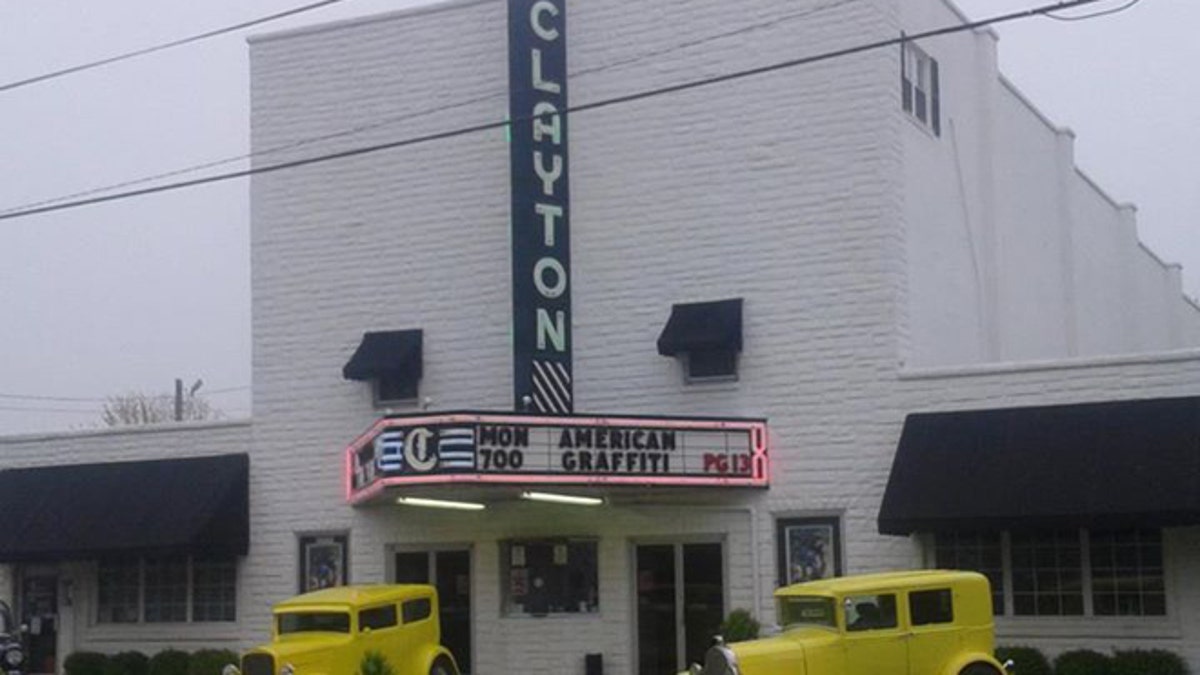
FILE: Undated. The exterior of the Clayton Theatre, an independent movie house in the small southern Delaware town of Dagsboro. (Clayton Theatre)
Movie-house owners -- as well as disability advocates -- are anxiously awaiting the release of an Obama administration proposal that would require theaters to install expensive technology so deaf and blind patrons can enjoy their films.
The proposal started within the Justice Department’s civil rights division in 2010 and now appears to be getting a White House review, with the final proposal expected to be made public in the coming weeks. The new policy would call for closed-captioning and audio narration technology to be installed, in a change supporters argue will give Americans with disabilities the same quality of experience as other movie-goers.
However, theater owners -- particularly those with small, independent houses -- say they cannot afford the technology shift which starts with converting to digital cinema.
The cost of that is about $70,000 per screen, though most theaters have already gone digital. Theaters then would have to purchase the headsets that narrate films for the blind and glasses that provide the closed-captioning for the deaf, at an additional cost.
“It is expense after expense, mandate after mandate,” said Joanne Howe, the owner of the Clayton Theatre, a movie house in the tiny southern Delaware town of Dagsboro. “The cost is a small fortune for a small theater like us.”
Howe told FoxNews.com that she had been showing films on the Clayton’s original projector from 1949 and had to ask for community donations and hold fundraisers to help pay for the digital upgrade – needed in part because Hollywood now distributes video, not film.
An industry expert says roughly 90 percent of U.S. movie houses already have the digital technology and 55 percent have the narration and closed-captioning devices.
The original Justice Department proposal to revise the 1990 Americans with Disabilities Act, which prohibits discrimination on the basis of disability, called for the changes to be made to roughly half the country’s estimated 40,000 movie screens.
However, it remains unclear what sparked renewed interest in the proposal, which has been before the Justice Department for almost three years.
The White House did not respond to questions about the disposition of the proposal, which leaves unclear exactly when it will be made public or how many theaters must make the changes.
But sources point to a recent administration notice -- involving the department and the White House Office of Budget and Management --about a “Notice of Proposed Rulemaking” in October that appears to have alarmed movie theater owners.
The Justice Department didn’t comment on the proposal but provided a link to the public notice.
Another possibility is that the proposal gained attention following Capitol Hill testimony in May from Justice Department lawyer Eve Hill.
“Movies are part of our shared cultural experience,” she told the Senate Committee on Health, Education, Labor and Pensions. “When individuals with sensory disabilities have the opportunity to attend movies that they can actually understand through the use of captions or audio description, they are exposed to new ideas and gain knowledge that contributes to their social development.”
Eric Bridges, a spokesman for the National Association of the Blind, declined to comment in detail until the report is made public but said the group in general “wants as much video description [of movies] as we can get.”
He also said the group has asked for similar accommodations for TV and live events including theater.
The National Association of Theatre Owners also has declined to comment until it reviews the final proposal.
Howe and husband Ed’s fundraising effort included “Clayton Classic” nights that started in January with “Casablanca,” and raising money from a book on the history of the theater. The theater originally opened with “One Touch of Venus,” starring Ava Gardner, and is named after former Secretary of State and Delaware Sen. John M. Clayton.
“It would be a shame” if the theater couldn’t meet the added costs, Joanne Howe said. “We’ve worked so hard.”




